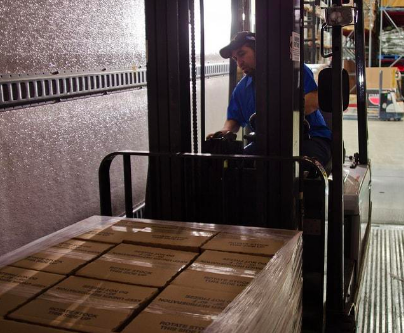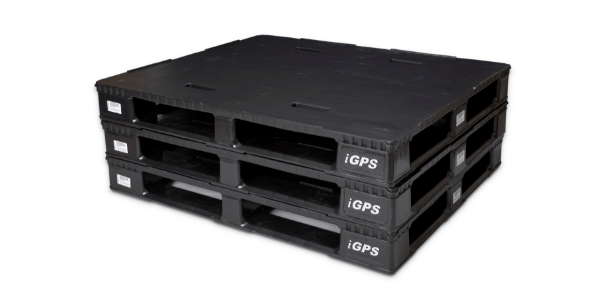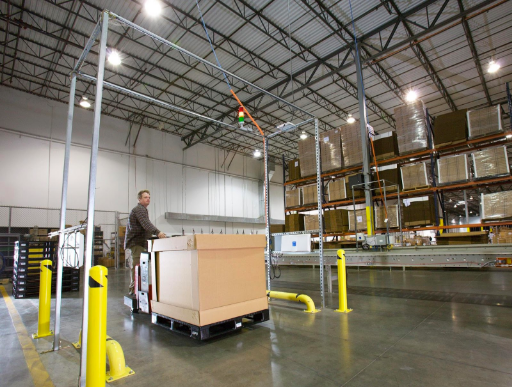Once your product is manufactured, then the real work begins of getting it to consumers via a complicated network of trucks and trains. A supply chain’s operations move staggering amounts of product every day, and its smooth function is what keeps your business going. There is no escaping the costs of running a supply chain; however, improving operational efficiency in your supply chain can save you money on every stop and every process in the chain. Chances are, there’s an opportunity right under your nose to increase your efficiency across your supply chain by replacing an outmoded piece of equipment with an updated version. The equipment? Wood pallets.
The common practice of using flimsy disposable wood pallets isn’t sustainable either economically or environmentally. Pallets cost money, and constantly buying new pallets and paying for their disposal is a constant drain. Pallet pooling programs, on the other hand, make much more sense economically, and they keep pallets in use longer, making them more environmentally friendly. Unfortunately, traditional pooling services don’t do much for operational efficiency. Reusable wood block pallets, at 70 pounds, are much heavier than disposable pallets, and the extra weight makes them less safe and more difficult to handle while slowing loading operations and increasing transportation costs.
To get both the advantages of a lighter platform and the benefits of pooling, many companies are switching to pooled plastic pallet programs. The combination of durability and easy sanitization means a plastic pallet increases operational efficiency while reducing your Total Cost of Business (TCOB). Three primary attributes of plastic pallets make these efficiency increases possible.

1. Lighter Loads Equal Lower Fuel Costs and Faster Loading
When product comes into your warehouse, you know it’s just one stop on the product’s journey to the consumer. This constant flow of product is what makes supply chain management challenging. At every stop, loads must be unloaded and reloaded onto different vehicles. To make this process efficient, it needs to proceed as smoothly and quickly as possible. Lightweight platforms make loading and unloading with a pallet jack faster and easier, saving time and money at every stop. A lightweight pallet also means that more of a truckload’s weight is saleable product, and in transit, a lighter weight vehicle uses less fuel, resulting in reduced costs and carbon emissions.
The switch to a plastic pallet slashes both transportation cost and handling times across the supply chain. Given how much a pallet is handled in logistics operations, a lighter plastic pallet offers the potential for an exponential increase in operational efficiency. The money and time saved using an easy-to-handle plastic pallet accrue positively and substantially over days, weeks, and months of operations.

2. Smooth, Durable Surfaces Mean Less Damaged Product
It doesn’t take a logistics expert to figure out that damaged product does not contribute to operational efficiency. Usually, in the interests of consumer safety, damaged products have to be discarded. This is a waste of the money and effort put into preparing and shipping the product, and it often happens as an unavoidable consequence of using an unreliable wood platform. Splinters and loose nails on the deck of a pallet damage product packaging and sometimes the product within. A pallet with imperfections that cause variations in the way its weight is distributed can throw the weight of the whole load off when it is moved by forklift. This often results in product damage as the whole load shifts.
Plastic pallets will not splinter and are not held together by nails that can protrude or fall out altogether.
Plastic pallets, on the other hand, have a uniform weight and density across the platform. They will not splinter and are not held together by nails that can protrude or fall out altogether. The smooth deck on high-quality plastic pallets supports loads evenly, and a raised plastic lip around the edge prevents product movement. All of these factors help to ensure that more product makes it through the supply chain and to the end user without damage, making the most of the cost of production and transportation.
3. Consistent Dimensions and Loads Cause Less Equipment Downtime
The bane of an operations manager is equipment that is out of commission because it requires repairs. Even worse is a malfunction that brings part of your Automated Storage and Retrieval System (ASRS) to a halt. A slowdown in operations due to the loss of one or more cranes or forklifts means downtime that can cost a company millions. To ensure this happens as rarely as possible, companies are increasingly looking for durable platforms designed to work with ASRS and other machinery without coming apart or leaving behind debris that may get caught in gears and tracks. With a plastic pallet, potential sources of machinery damage like nails and splinters are removed from the supply chain entirely.
The evenly distributed and lighter weight of a plastic pallet eases wear and tear on machinery, allowing it to operate for longer of periods of time without critical breakdowns.
Old-fashioned platforms have other effects on your supply chain, too. Reusable wood pallets often contribute to heavy, unbalanced loads that can be a strain on equipment like forklifts and trucks. This stress accumulates and eventually causes minor damage that can become major damage over time. The evenly distributed and lighter weight of a plastic pallet eases wear and tear on machinery, allowing it to operate for longer of periods of time without critical breakdowns, ultimately reducing costs and improving your supply chain’s efficiency.
Improved Operational Efficiency Make Plastic Platform Pooling the Obvious Choice
Plastic pallets’ lighter weight and greater durability slash operational cost while ensuring more of your product makes it into the hands of consumers. These improvements in operational efficiency pay off every single day in reduced TCOB. A lower cost of business frees up money in your budget to make your products more price competitive, perform research and development on new products, or expand operations into new markets.
A plastic platform pooling program makes the switch to plastic pallets easy by managing your reverse supply chain for you. A pooling service picks up pallets at the end of the supply chain, processes them, and returns them to the pool. This ensures a supply of sanitized pallets is ready where you need them without adding to the complexity of your existing supply chain. It’s operational efficiency that anyone in logistics can appreciate.
To lower your Total Cost of Business with the iGPS pallet while increasing operational efficiency through reduced product damage, lower fuel usage, and less downtime, give our team a call at 1-800-884-0225, email a specialist at switch@igps.net, or visit our contact page.
Image 1: Unsplash User Jametlene Reskp
Image 2: Flickr CC US Department of Agriculture




